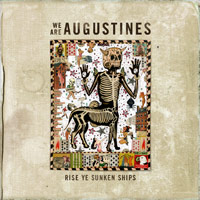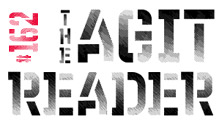
Ghost on the Canvas
Surfdog
Save for a few AM gold hits (most notably “Wichita Lineman” and “Rhinestone Cowboy”), the legacy of Glen Campbell is rooted more in his time playing with the Wrecking Crew, a ’60s session band that backed up everyone from Sinatra to Elvis, and giving the “countrypolitan” gloss to a number of covers throughout his solo career. Even then, those hits bearing his name were cowritten with Jimmy Webb, so it’s no surprise that Ghost on the Canvas, Campbell’s final album, is credited to a handful of notable songwriters who delivered the tunes with Campbell’s svelte country voice in mind. Over his last few albums, Campbell has undergone a makeover of sorts, akin to Rick Rubin joining forces with Johnny Cash, to appeal to a modern audience on which a classic like “Galveston” is lost. Given that most people under the age of 30 only know of Campbell and not about him, the experiment has not exactly worked as planned. Maybe it’s because Campbell was never an outlaw like Cash or Waylon Jennings, nor was he a ubiquitous tennant of pop culture like Willie Nelson or Neil Diamond. Campbell’s music was always the sound of a guy in boots admiring a Los Angeles sunset and never a cowboy’s lament or a hell-raising stomp.
On Ghost on the Canvas, not much has really changed since those defining recordings from ’70s. Weeping strings, lilting pedal steel and grand orchestral measures still insulate Campbell’s pristine, yet rambling, guitar playing. The decision to record Ghost on the Canvas came after Campbell was diagnosed with onset Alzheimer’s disease, and that feeling of riding off into the horizon pervades the song cycle of the record with very powerful results. Trying to encapsulate an entire career with as many highs and lows as Campbell’s in one album is an overwhelming task, but the songwriters enlisted seem to revel in the opportunity. The title track and “Any Trouble,” written by Paul Westerberg, are the mighty, life-affirming standouts on Ghost, with the latter pinching slightly from the bittersweet grace of Nilsson’s iconic “Everybody’s Talking.” Hearing Campbell belt out “Hold on Hope” only adds resonance to Robert Pollard’s once polarizing balladry. When it was originally released as a Guided By Voices single, Pollard shunned it, but now it’s assured, after knowing the weight of the words, that Pollard no longer regrets writing it. Elsewhere, there are lesser cuts in which Campbell is backed by luminaries ranging from Chris Isaak and Dick Dale to Billy Corgan, but it’s the songs Campbell cowrote with producer Julian Raymond that carry the most emotional baggage. “Strong” is as reflective and redemptive as they come when Campbell sings, “I’ve seen for the first time in my life, fears.” Consequently, with the Dandy Warhols backing him up, it’s also one of the album’s quirkiest collaborations. As schmaltzy or “un-country” as Campbell may be considered among a modern listening public, there’s no denying that the guy has had a whirlwind career, and this is the perfect record for the rhinestone cowboy’s last stand.
Kevin J. Elliott

La Liberacion
V2/Cooperative
It seems bizarre that not that long ago the notion that you could dance to a band seemed like a radical proposition. One of the more intriguing dealers of rockin’ dance grooves was the Brazilian band Cansei de Ser Sexy, better known as CSS. Their thrift-store sonic aesthetic mixing lo-fi electronics with rock guitars, as well as their use of Brazilian and English lyrics, helped them cut a distinctive swath. The fact that CCS was five ladies and one dude strong was also a striking difference from their peers. Yet, none of that would matter if they didn’t deliver. Thankfully the group’s self-titled debut did with songs like the iPod shilling “Music Is My Hot Hot Sex” and “Let’s Make Love and Listen to Death from Above.” But then came the disappointing sophomore album Donkey and the departure of their drummer. Now, after a three-year absence, they’re back with La Liberacion.
CSS never made any excuses for their love of pop music, but the first few songs of La Liberacion seem as if they needed someone to gently remove the radio from the room. For example, “City Grrl” could have come from Ke$ha’s discard pile. It’s a shame because it has an interesting flamenco-ish guitar intro that’s quickly abandoned. The opening three songs have a generic electro-pop wash to them, although “Hits Me Like A Rock” does fare slightly better on repeat playing. Basically, if you only heard the first half of the album, you’d be hard pressed to see why people used to get so excited.
But then La Liberacion does a 180. A third of the way through, CSS sheds the glitter and turns up the “rock” knob. This embrace of indie rock helps to refocus the album in drastic ways. The songs are advantageously less self-conscious and more raucous. And while the electro-pop takes a back seat, the songs remain just as danceable. While La Liberacion isn’t as infectious as CSS’s debut, it’s a nice reminder of why everyone once cared.
Dorian S. Ham

Rise Ye Sunkin Ships
Oxcart
They say that suffering breeds the greatest art, but no one could have blamed Billy McCarthy if he decided to never write another lick. With both his mother and brother committing suicide, it would have been completely understandable if he had just curled up in a fetal position and hid from the world. Instead, the We Are Augustines frontman seems to have taken the opposite approach. As when he sings, “Ain’t gonna wait around for some pain to kick in,” at the end of “Headlong into the Abyss,” he seems to have delved into his craft for the analgesic to his misery.
As one might imagine, We Are Augustines’ debut, Rise Ye Sunken Ships, is something of an epic affair. On tracks like the opening “Chapel Song” and “Juarez,” McCarthy leads the band straight into the eye of the storm. On the former, he hitches his shaky vocals to a propulsive rhythm and intermittent synth waverings, but still seems optimistic even amongst the minor chords, while on the latter he addresses his familial woes, not only singing about how he had “a drunk for a mother and a saint for a brother,” but bringing his father and his sister into the picture. But while the tragedies of his life no doubt inform McCarthy’s mindset throughout Rise, the record’s success is derived from the pains the Augustines take to diverge lyrically and musically. “Strange Days” mixes baritone sax into its mix of crackling beats and catchy bittersweets, and “Augustine” is a sweeping pop tune on which McCarthy encourages his younger self in the second person to keep his head above water. Covering Crooked Fingers’ “New Drink for the Old Drunk” seems unnecessary in the scope of the album, but otherwise McCarthy and his mates have sewn a potent silver lining to the singer’s dark cloud.
Stephen Slaybaugh

One Man Mutiny
Done to Death
On his second solo record, Tommy Stinson seems well-settled into an accidental godfather role. Which is still odd when he reappears every few years, considering most fans, when they hear his name, still see the fresh-faced, big-haired teen of his Replacements days. The image of him as the Mats’ kid brother has been warped further through the years as he landed that prime gig collecting checks as the ostensible bass player for the ostensible Guns N’ Roses and is also the current bassist for Soul Asylum, themselves considered kind of the little brothers of the Minneapolis scene back in the day. (Yes, not only are they still around, but have a new record coming out soon.)
But here’s Stinson, on his second solo record, doing charming duets with his wife, her uncle playing some slide guitar, and a couple GNR-ers chiming in on a tune recorded in a restaurant. One Man Mutiny is being released on Stinson’s own quintessentially self-effacingly named Done to Death label, and he’s donating proceeds from this record to the Timkatec Schools in Haiti. And it’s not just the matured surroundings of the album, but the overall late-summer vibe of the music that makes such an effort to be critic-proof. The guy’s just having harmless fun—and doing a pretty good job at it. With the way Stinson’s new songs sound, after years of doing this solo and in a few band projects, it may finally be legitimate to infer that he might have had more input in the Replacements’ songwriting than we thought, but kept his trap shut because he was the little kid in the band and subordinate to one of the great songwriters of the end of the 20th century, Paul Westerberg. Or vice-versa: that Westerberg has always been the prime influence on Tommy from the get-go. Stinson’s chord changes and lyrical twists of phrase (sung with remnants of that Minneapolis accent and cigs of yesteryear), the guitar solos on the codas—everything rings like the last two Replacements’ records, “All This Way for Nothing” and “Seize the Moment” being the two most, not glaring exactly, but glowing examples. There’s also the acoustic lament (“Come to Hide”), and The Faces slide guitar chugger (“It’s a Drag”).
But since at least the Bash & Pop days, Stinson’s records have always had an air of the relaxed ambition that we used to derisively call “bar-band rock.” There ain’t much of that out there anymore, so Stinson’s easy grooves go down like that low-carb beer you expected to suck, but wasn’t bad for the price. Plus, he can pull off some real heartfelt pining (the country-ish waltz, “Match Made in Hell”).
But even for a record that Stinson probably futzed around with for a few years in between trips to the ATM to check his GNR stipends, there is still more than a little filler. But again, low ambition, nice lean production, and just a tad more scruff way down in his baby-faced throat (“One Man Mutiny”) add up to another welcome visit from the friendly ghost of a past that shaped so many alt-rock fans’ lives.
Eric Davidson

Swimming Through Sunlight
Old Flame
With bands like Times New Viking having proven that brazen, feedback-laden, warts-and-all records can hang with the big studio CDs, nitpicking about how much fidelity a recording possesses is like sectioning off emo bands into different genres by adding different letters to the word. Who cares? Cleveland’s Total Babes (not to be confused with the surf girl group of the same name) is the lo-fi offshoot of mid-fi jangle jinglers Cloud Nothings. Lo-fi is a bit misleading, though, as the band’s debut, Swimming Through Sunlight, has a live energy, presumably because it was recorded that way, whereas Cloud Nothings sounds like one guy multi-tracking (because Dylan Baldi records that way).
The raw sound of this record is nothing new (see Henry’s Dress), but these kids still deliver glittering power-pop dunked in Cuyahoga sludge and mean every second of it. Swimming skirts the not-so-twee lines of San Francisco pizza punk, substituting that cabalistic West Coast ocean breeze for a firmly rooted, silty North Coast rust gust. Plenty of songs on this record could be wince-inducing cute, but the band never wavers from a sincerity that keeps them away from ironic. “Without Your Heart,” the obligatory slow song is mid-90s loud-quiet-loud indie rock from the core, but the vocal harmonies and tweaked out distortion provide a balanced and mature sound reminiscent of any of Built To Spill’s early tear-jerkers. Total Babes can craft a great pop hit, evidenced by the chorus of “Be So True”: “I swear I’ll be so true to you, because there’s nothing to be true to,” which has been stuck in my brain since I first heard it. There are 10 incredibly catchy and freshly original songs on this record, and soon enough I’m sure that they’ll all pop into my mind some time out of the blue. Let’s just hope Ric Ocasek doesn’t get a hold of them or they’ll end up sounding like Weezer. Or, heaven forbid, they drink too much PBR and become hip enough for the mash-up crowd. Remember they make Great Lakes in Cleveland, dudes.
Michael P. O’Shaughnessy
MP3: “Be So True”
ALBUM REVIEWS
Ganglians, Still Living
Hercules & Love Affair, Blue Songs
Active Child, You Are All I See
Chelsea Wolfe, Apokalypsis
Case Studies, The World Is Just a Shape to Fill the Night
The War on Drugs, Slave Ambient
Jesse Sykes & the Sweet Hereafter, Marble Son
Maria Taylor, Overlook
Her Space Holiday, Her Space Holiday
The Horrors, Skying
Tunnels, The Blackout
Jeff Bridges, Jeff Bridges
NewVillager, NewVillager
The Duke & the King, The Duke & the King
